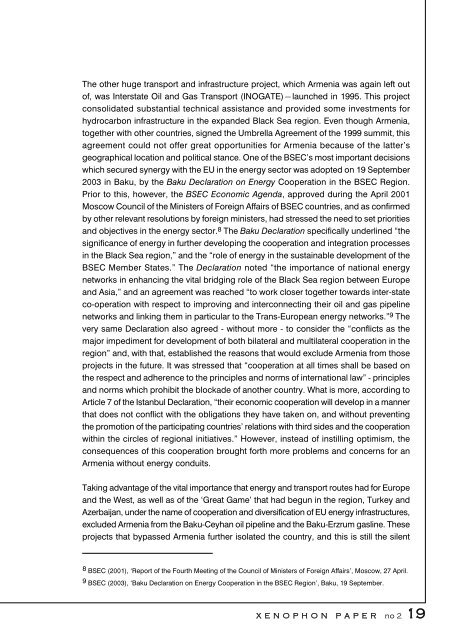Xenophon Paper 2 pdf - ICBSS
Xenophon Paper 2 pdf - ICBSS
Xenophon Paper 2 pdf - ICBSS
You also want an ePaper? Increase the reach of your titles
YUMPU automatically turns print PDFs into web optimized ePapers that Google loves.
The other huge transport and infrastructure project, which Armenia was again left out<br />
of, was Interstate Oil and Gas Transport (INOGATE)—launched in 1995. This project<br />
consolidated substantial technical assistance and provided some investments for<br />
hydrocarbon infrastructure in the expanded Black Sea region. Even though Armenia,<br />
together with other countries, signed the Umbrella Agreement of the 1999 summit, this<br />
agreement could not offer great opportunities for Armenia because of the latter’s<br />
geographical location and political stance. One of the BSEC’s most important decisions<br />
which secured synergy with the EU in the energy sector was adopted on 19 September<br />
2003 in Baku, by the Baku Declaration on Energy Cooperation in the BSEC Region.<br />
Prior to this, however, the BSEC Economic Agenda, approved during the April 2001<br />
Moscow Council of the Ministers of Foreign Affairs of BSEC countries, and as confirmed<br />
by other relevant resolutions by foreign ministers, had stressed the need to set priorities<br />
and objectives in the energy sector. 8 The Baku Declaration specifically underlined “the<br />
significance of energy in further developing the cooperation and integration processes<br />
in the Black Sea region,” and the “role of energy in the sustainable development of the<br />
BSEC Member States.” The Declaration noted “the importance of national energy<br />
networks in enhancing the vital bridging role of the Black Sea region between Europe<br />
and Asia,” and an agreement was reached “to work closer together towards inter-state<br />
co-operation with respect to improving and interconnecting their oil and gas pipeline<br />
networks and linking them in particular to the Trans-European energy networks.” 9 The<br />
very same Declaration also agreed - without more - to consider the “conflicts as the<br />
major impediment for development of both bilateral and multilateral cooperation in the<br />
region” and, with that, established the reasons that would exclude Armenia from those<br />
projects in the future. It was stressed that “cooperation at all times shall be based on<br />
the respect and adherence to the principles and norms of international law” - principles<br />
and norms which prohibit the blockade of another country. What is more, according to<br />
Article 7 of the Istanbul Declaration, “their economic cooperation will develop in a manner<br />
that does not conflict with the obligations they have taken on, and without preventing<br />
the promotion of the participating countries’ relations with third sides and the cooperation<br />
within the circles of regional initiatives.” However, instead of instilling optimism, the<br />
consequences of this cooperation brought forth more problems and concerns for an<br />
Armenia without energy conduits.<br />
Taking advantage of the vital importance that energy and transport routes had for Europe<br />
and the West, as well as of the ‘Great Game’ that had begun in the region, Turkey and<br />
Azerbaijan, under the name of cooperation and diversification of EU energy infrastructures,<br />
excluded Armenia from the Baku-Ceyhan oil pipeline and the Baku-Erzrum gasline. These<br />
projects that bypassed Armenia further isolated the country, and this is still the silent<br />
8 BSEC (2001), ‘Report of the Fourth Meeting of the Council of Ministers of Foreign Affairs’, Moscow, 27 April.<br />
9 BSEC (2003), ‘Baku Declaration on Energy Cooperation in the BSEC Region’, Baku, 19 September.<br />
X E N O P H O N P A P E R no 2 19









